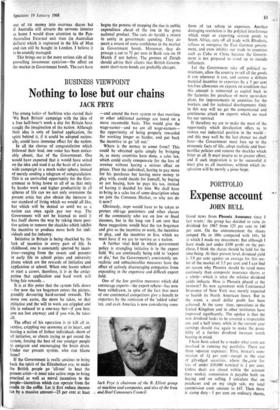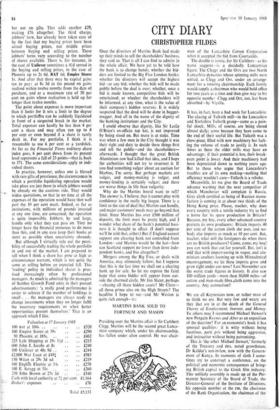Expense account
PORTFOLIO JOHN BULL
Good news from Phoenix Assurance since 1 last wrote: the group has decided to raise its dividend for 1967 from 125 per cent to 140 per cent. On the announcement the shares jumped lOs to 180s compared with 141s 3d at which I made my investment. But although I have made just under £100 profit on the pur- chase, I think the shares should be held for the time being. At their present level, dividend yield is 3.9 per cent against an average for this sec- tor of the market of 3.5 per cent and I can find no reason why Phoenix should be rated more cautiously than composite insurance shares as a whole—which is what the relative dividend yields indicate. How is Phoenix placed at the moment? Its new agreement with Continental Insurance of New York was merely expected to banish its North American losses. But in the event, a small dollar profit has been achieved. At the same time, operations in the United Kingdom and in other territories have improved significantly. The upshot is that the new dividend looks to be covered a respectable one and a half times, while in the current year earnings should rise again to make the possi- bility of a further dividend increase worth bearing in mind.
I have been asked by a reader what costs are involved in running my portfolio. There are three separate expenses: First, broker's com- mission of 1 per cent—except in the case of gilt-edged securities, where the orate for lots of under £10,000 nominal is f per cent. Unless deals are closed within the account (two weeks), commission is payable both on buying and on selling. I calculate that on purchases and on my single sale, my total commission costs amount to £47. Then there is stamp duty-1 per cent on ordinary shares,
but not on gilts. That adds another £29, making £76 altogether. The third charge, jobbers' turn, has already been taken care of by the fact that my buying prices have been actual buying prices, not middle prices between buying and selling prices. These jobbers' turns vary according to the number of shares available. There is, for instance, in the case of Unilever sometimes a 41c1 spread in the buying and selling prices, in the case of Phoenix up to 2s 6d, BAT 6d, Empire Stores Is. And after that there may be capital gains tax to pay: at 8s 3d in the pound on gains realised within twelve months from the date of purchase, and at a maximum rate of 30 per cent on gains whose realisation is held up for longer than twelve months.
The point about expenses is more important thin it looks for it sets a limit to the degree to which portfolios can be suddenly liquidated in front of a suspected break in the market. Total expenses can hardly be less than 4 per cent a share and may often run up to 6 per cent or even beyond if a share is rarely dealt in. For my portfolio, I think it is reasonable to use 6 per cent as a yardstick. As far as the Financial Times ordinary share index goes, 6 per cent down from its present level represents a fall of 23 points—that is, back to 371. The same considerations apply to indi- vidual shares.
In practice, however, unless one is blessed with rare gifts of prescience, the circumstances in which a portfolio liquidating operation would take place are just those in which jobbers would be already on the cautious side. They would widen quotations, so that in no time at all the expenses of the operation would have shot well past the 10 per cent mark. Indeed, as far as institutions, with millions of pounds invested at any one time, are concerned, the operation is quite impossible. Jobbers, by and large, handle only what they can pass on. They no longer have the financial resources to do more than this, and in any case keep their books as short as possible when uncertainty abounds.
But although I virtually rule out the possi- bility of successfully trading the whole portfolio in and out of the market, I am prepared to sell when I think a share has gone as high as circumstances warrant, which is not quite the same as selling before an expected fall. This `trading' policy in individual shares is prac- tised increasingly often by professional managers. As much is admitted by the managers of Scotbor Growth Fund units in their present advertisements: 'a really good performance is easier to achieve if the number of holdings is small . . . the managers are always ready to change investments when they no longer fulfil the necessary requirements or when better opportunities present themselves.' That is an approach which I like.
Valuation at 17 January 1968
100 BAT at 104s
£520 100 Empire Stores at 59s £290 50 Phoenix at 185s. £462 225 Lyle Shipping at 19s lid £215 600 John I. Jacobs at £240 100 Unilever at 48s 9d £244 £2,000 War Loan at £491 £985 150 Witan at 29s 3d xd f219 100 EngliN Electric at 54s £270 100 E. Scragg at 51s . .. £260 250 John Brown at 27s 3d
Cash with local authority at 7-1 per cent £1,164 Deduct : expenses .. £76 Total £5,133



































 Previous page
Previous page